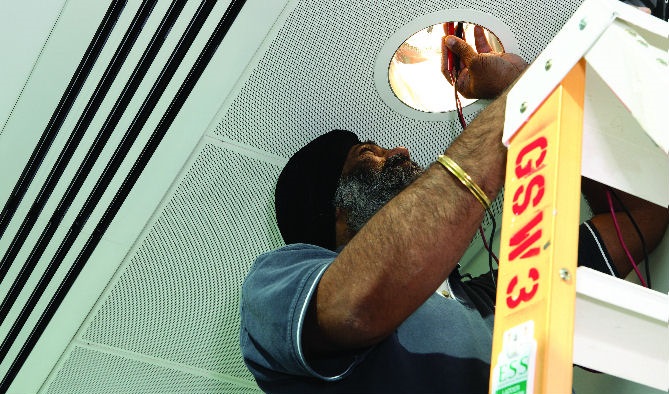Where everything’s for sale
MIPIM, the international property trade show attended by millionaire private developers, estate agents and public authorities, has every year for more than two decades been held in Cannes.
It’s relocation to London this year testifies to a world that’s descending into the capital and spreading like a virus throughout the country – a world in which nothing is sacred, and everything is for sale.
For all the media frenzy about the trade show’s new London location, it may as well have been held in a luxury town on the French Riviera. As protestors, including Unite Community members, peacefully demonstrated outside, MIPIM attendees brought with them their cloistered Cannes attitudes, rubbing shoulders, sipping champagne, and “networking.”
Instead of engaging with the arguments the protestors compellingly voiced outside the Olympia hall in Kensington, MIPIM’s visitors chatted inside about the protest with that very particular mixture of smug contempt, condescension and fear that is the special vanguard of the super-rich.
But it was the protestors who had something real to fear – the only arrest on day one of MIPIM was of a conference attendee, who allegedly assaulted an innocent young man democratically voicing his opinions outside.
“No deals are made here”
MIPIM styles itself as property trade show. As the event kicked off early Wednesday morning, a conference organiser emphasised with an expansive smile, “No deals are made here; people come here to network.” This was the first instance of MIPIM doublespeak that would become a reoccurring theme throughout the day.
If, indeed, no deals are made at the event, then surely they are initiated, discussed and developed just short of signing on the dotted line. The exhibition hall is perfectly set up for just this sort of private wheeling and dealing – many of the exhibitor booths were elaborate structures with chairs and tables and nooks and crannies, enabling attendees to “network” in isolation.
Day one had not even ended as MIPIM’s attending reporters were greeted to a press release in their inboxes, celebrating the “£400m Leeds commercial and residential development” that is to “get underway on Day One of MIPIM UK.”
The release, hundreds of words long, detailed the thousands of square feet of office space, the thousands of new homes, a new railway station, and the millions of pounds by which the economy will inevitably be “boosted.”
As ever, “affordable housing” plays a bit role in the release, a vague promise not clearly defined.
Affordable housing, anyone?
Although this may seem an unfair attack on developers and local authorities who may genuinely seek to build affordable homes through deals cemented at MIPIM and elsewhere, history has proven otherwise.
Nine Elms, a massive south London regeneration project involving many big players in private development, including Barrat, Berkley Group, Ballymore Group and Dalian Wanda, has already got off to a rocky start.
As noted in Unite’s briefing on MIPIM, only a tiny percentage of the proposed 9,000 homes at Nine Elms will be for social rent. What’s more, London Mayor Boris Johnson controversially allowed developer Dalian Wanda to halve the number of jobs it advertised it would create as a result of its luxury hotel and office space in the area.
But the Nine Elms project was conspicuously displayed at MIPIM, complete with a glass-encased miniature model of the full development. The exhibitor manning the Nine Elms booth, when asked about affordable housing, proudly trumpeted the 4,000 affordable homes to be built. When asked the definition of “affordable,” he gave the Mayor’s new definition of up to 80 per cent of market rent.
As Unite and others have pointed out before, this new definition of “affordable” makes a mockery of the word. In some areas in London, a family would need an eye-popping £80,000 salary to afford this so-called “affordable housing.”
So what about social housing?
Shrugging his shoulders, the Nine Elms representative responded, “Social housing, affordable housing—same thing.”
Out of touch
It was this very attitude that permeated MIPIM, one in which genuinely affordable housing was either discussed with mock-concern, as an afterthought, or not at all.
MIPIM paid predictable lip service to the housing crisis faced by millions across the country in its special session: “The case for investing in affordable housing.” Tellingly, the session was originally called “Investing in affordable housing: is it worth it?” but was later changed.
In the session, Robert Grundy, head of housing for Savills, had what he called “silver bullets” for the affordable housing crisis. Prime among these so-called solutions was expanding the definition of affordable.
“In my view affordable housing can mean owner-occupied housing, it can mean affordable rents, social rents, shared ownership, intermediate tenure, and even full market rents,” he said.
In his expansion of the term “affordable,” the word completely loses meaning. And if it couldn’t get any worse, Grundy urges especially targeting those “on low-income”, which sounds nice until we get yet another dose of MIPIM doublespeak.
The “low-income” people Grundy speaks of are “people like you and me but early in their careers.”
Even by modest estimates, to think any of the suits and ties in the room would have been truly “low-income” early in their careers is a laughable notion, one that shows the extent to which the mega-rich of MIPIM are so far removed from any semblance of reality.
It’s this same skewed orientation to the real world at large that allows David Cameron to announce tax cuts for supposedly “low-income” earners and say it with a straight face.
In Mayor Boris Johnson’s keynote address, he proudly announced that, despite the protest outside, London would be “open for business.” Looking at the dozens of local authority booths spread across the exhibition hall — all stocked with luxurious brochures and plastered with advertising slogans — you get an unsettling feeling that “open for business” will inevitably mean closed for everyone else.
 Like
Like Follow
Follow


